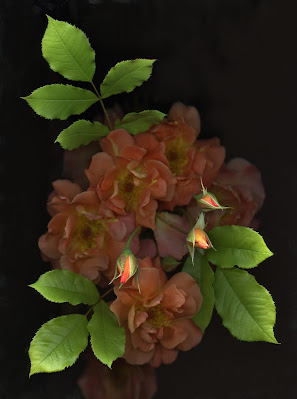 | ||
| Rosa 'Westerland' 27 July 2022 |
The sentence "Rose is a rose is a rose is a rose" was written by Gertrude Stein as part of the 1913 poem "Sacred Emily", which appeared in the 1922 book Geography and Plays. In that poem, the first "Rose" is the name of a person. Stein later used variations on the sentence in other writings, and the shortened form "A rose is a rose is a rose" is among her most famous quotations, often interpreted as meaning "things are what they are", a statement of the law of identity, "A is A". In Stein's view, the sentence expresses the fact that simply using the name of a thing already invokes the imagery and emotions associated with it, an idea also intensively discussed in the problem of universals debate where Peter Abelard and others used the rose as an example concept. As the quotation diffused through her own writing, and the culture at large, Stein once remarked, "Now listen! I'm no fool. I know that in daily life we don't go around saying 'is a ... is a ... is a ...' Yes, I'm no fool; but I think that in that line the rose is red for the first time in English poetry for a hundred years." (Four in America).
She herself said to an audience at Oxford University that the statement referred to the fact that when the Romantics used the word "rose", it had a direct relationship to an actual rose. For later periods in literature this would no longer be true. The eras following Romanticism, notably the modern era, use the word rose to refer to the actual rose, yet they also imply, through the use of the word, the archetypical elements of the romantic era.Wikipedia
Below is her poem Sacred Emily
Argonauts.
That is plenty.
Cunning saxon symbol.
Symbol of beauty.
Thimble of everything.
Cunning clover thimble.
Cunning of everything.
Cunning of thimble.
Cunning cunning.
Place in pets.
Night town.
Night town a glass.
Color mahogany.
Color mahogany center.
Rose is a rose is a rose is a rose.
Loveliness extreme.
Extra gaiters.
Loveliness extreme.
Sweetest ice-cream.
Page ages page ages page ages.
Wiped Wiped wire wire.
Sweeter than peaches and pears and cream.
Wiped wire wiped wire
Extra extreme.
Put measure treasure.
Measure treasure.
Tables track.
Nursed.
Dough.
That will do.
Cup or cup or.
Excessively illigitimate.
Pussy pussy pussy what what.
Current secret sneezers.
Ever.
Mercy for a dog.
Medal make medal.
Able able able.
A go to green and a letter spoke a go to green or praise or
Worships worships worships.
Door.
Do or.
Table linen.
Wet spoil.
Wet spoil gaiters and knees and little spools little spools or ready silk lining.
Suppose misses misses.
Curls to butter.
Curls.
Curls.
Settle stretches.
See at till.
Louise.
Sunny.
Sail or.
Sail or rustle.
Mourn in morning.
The way to say.
Patter.
Deal own a.
Robber.
A high b and a perfect sight.
Little things singer.
Jane.
Aiming.
Not in description.
Day way.
A blow is delighted.
In this blog I am questioning and refuting that the scan of a rose, is the scan of a rose, is the scan of a rose.
One of the delights of being a portrait photographer is to have the opportunity to photograph a person more that once and in particular with the passing of time.
My original scan of Rosa ‘Westerland’ appeared on the May cover of Canadian Gardening in what I believe may have been the first plant scan in any gardening magazine. See below:
Since 2006 our Westerland (no my Westerland with Rosemary gone) is persistently glorious and with no fuss. It is easy to grow and the bush is now at least 18 years old. I scan it often. What you see here is something I rarely do which is to snip off a large bouquet because I know that nobody will be coming to my garden for the next while. I do not feel guilty in cutting them.
I must add that Rosemary until the advent of Rosa ‘Westerland’ had banned anything orange
(or red) in our Kerrisdale garden. She warmed up to this aggressive (nicely)
grower and smiled at me when I told her that it smelled of synthetic apricot
jam.







